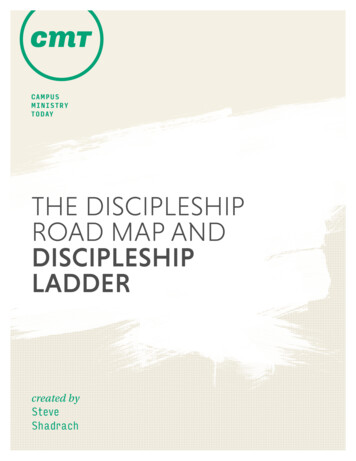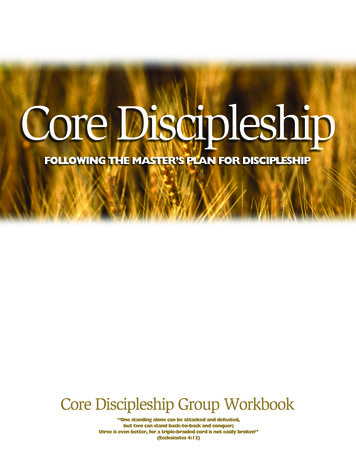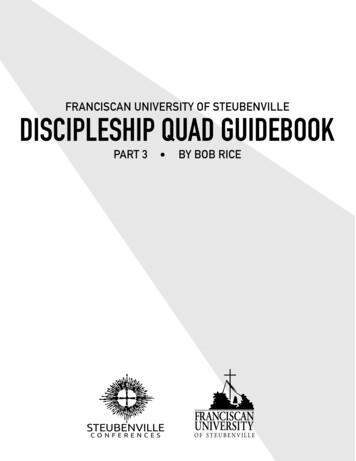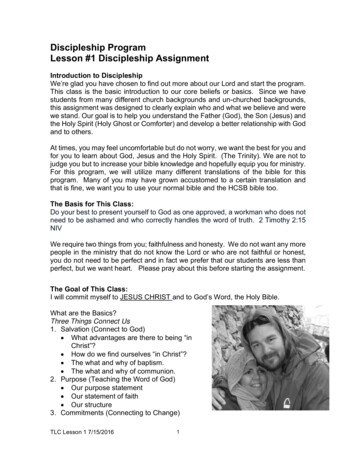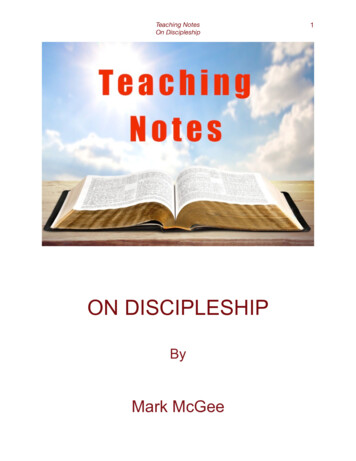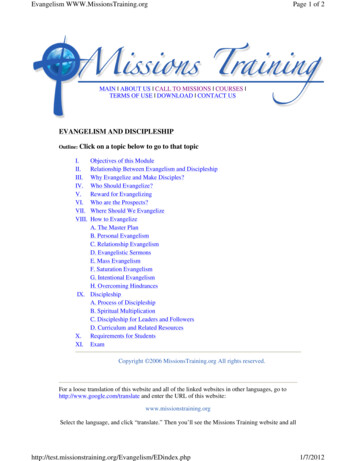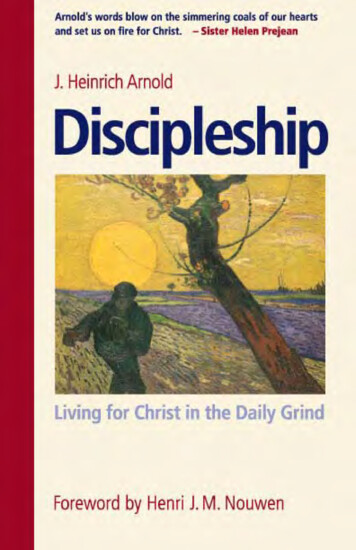
Transcription
DiscipleshipJ. Heinrich Arnold
Please share this e-book with your friends. Feel free to e-mailit or print it in its entirety or in part, but please do not alter it inany way. If you wish to make multiple copies for wider distribu tion, or to reprint portions in a newsletter or periodical, pleaseobserve the following restrictions: You may not reproduce it for commercial gain.You must include this credit line: “Copyright 2007by Plough Publishing House. Used with permission.”This e-book is a publication of Plough Publishing House,Farmington, PA 15437 USA (www.plough.com) andRobertsbridge, East Sussex, TN32 5DR, UK(www.ploughbooks.co.uk)Copyright 2007 by Plough Publishing HouseFarmington, PA 15437 USAAll Rights Reserved
Discipleship is not a question of our own doing;it is a matter of making room for Godso that he can live in us.J. H. Arnold
ContentsForeword . viiIntroduction. xThe DiscipleThe Inner Life . 1Repentance . 11Conversion . 17Faith .21Dogmatism. 29Commitment.34The Lower Nature .38Purity . 64Trust. 68Reverence.73Surrender.75Sincerity . 82The ChurchThe Church . 89Community. 96Leadership .106Gifts . 114Forgiveness . 121Unity . 128Church Discipline. 134Baptism. 141The Lord’s Supper.147Love and Marriage . 151Family Life.169
Illness and Death . 188Evil and Darkness . 197The Fight. 205World Suffering. 217Mission. 226The Kingdom of GodJesus.237The Cross . 254Salvation . 261The Kingdom of God . 269More Free e-books.280
ForewordDiscipleshipis a tough book. As I began reading it,Heinrich Arnold’s words touched me as a doubleedged sword, calling me to choose between truth andlies, salvation and sin, selflessness and selfishness, lightand darkness, God and demon. At first I wasn’t sure ifI wanted to be confronted in such a direct way, and Idiscovered some resistance in myself. I want the goodnews of the Gospel to be gentle, consoling, comfort ing, and to offer inner peace and harmony.But Arnold reminds me that the peace of the Gospelis not the same as the peace of the world, that the con solation of the Gospel is not the same as the consola tion of the world, and that the gentleness of the Gospelhas little to do with the “free for all” attitude of theworld. The Gospel asks for a choice, a radical choice, achoice that is not always praised, supported, and cel ebrated.Still, Arnold’s writing is not harsh, unbending, fa natical, or self-righteous. To the contrary, it is full oflove. Tough love, but real love. It is this love that flowsfrom the broken heart of Jesus. What makes Arnold’swords so healing is that they are not based on an idea,an ideology, or a theory, but on an intimate knowledge
of Jesus Christ. Jesus, the Christ, is in the center ofall the suggestions, advice, and care expressed in thesereflections. This is truly a Christ-centered book.Heinrich Arnold does not speak in his own name.He speaks in the name of Jesus. He has heard clearlythe words of Paul to Timothy: “Before God, and be fore Christ Jesus, who is to be the judge of the livingand the dead, I charge you, in the name of his ap pearing and his kingdom: proclaim the message and,welcome or unwelcome, insist on it. Refute falsehood,correct error, give encouragement – but do all withpatience and with care to instruct ” (2 Tim. 4:1–2).It is Arnold’s deep rootedness in Jesus Christ thatmakes him a very wise, a very safe, and a very challeng ing guide in our spiritual journey. But there is more:his rootedness is not simply a rootedness in the Christwho lived long ago; it is a rootedness in the Christ whois present today in the life of the community of faith.Arnold is not a pious, sentimental guide. Everyword he speaks comes from his experience in com munity, where discipleship is lived. It is in communitythat we are tested and purified. It is in community thatwe learn what forgiveness and healing are all about. Itis in community that we learn who our neighbor is.Community is the true school of love. Arnold livedcommunity all of his life. He knew its demands and itsrewards. Most of all, he knew that it is in communitythat we encounter the Christ of the Gospel.
I am very grateful for this book. It is a propheticbook in a time in which few people dare to speak un popular but truly healing words.I pray that those who read this book won’t be afraidto be confronted, and I trust that the word of God thatcomes to them through it will bring true comfort, trueconsolation, true hope, and true courage.Henri J.M. Nouwen
IntroductionSome books are easiest to describe by saying what theyare not. This is not a collection of devotions or medi tations, not a “feel-good” journal about walking withGod, and not a guide for self-improvement or personalspiritual growth. It is, very simply, a book about disci pleship – about following Christ humbly, obediently,and with an open heart. And it is written by a manwhose message cannot be understood in any other way.Johann Heinrich Arnold (1913–1982) grew upsurrounded by people for whom such discipleship tookshape in a dramatic way. When he was six, his parents,Eberhard and Emmy, left their upper-class home inBerlin and moved to Sannerz, a village in central Ger many. There, with a small circle of friends, they set outto live in full community of goods on the basis ofActs 2 and 4 and the Sermon on the Mount. It wasa time of tremendous upheaval. The same post-warrestlessness that drove his father, a well-known editor,theologian, and public speaker, to this leap of faithdrove thousands of others to rise up against the rigidsocial and religious conventions of the period andseek new ways of life. These were Heinrich’s formativeyears, and the steady stream of young anarchists and
tramps, teachers, artisans, and free-thinkers who camethrough the little community influenced him pro foundly. All of them had abandoned the hypocrisy of aChristendom that had grown meaningless, and manyfelt drawn to the life of dedication and joy they foundat Sannerz.Heinrich himself felt the call to follow Christ at theage of eleven. Later, as a young man, he committedhimself to life-long membership in the church com munity, known by then as the Bruderhof, or “place ofbrothers.” In 1938 he was chosen as a servant of theWord, or pastor, and from 1962 until his death heserved as elder for the growing Bruderhof movement.The flock in Arnold’s care was not what one couldcall a typical church, and he was anything but a pastorin the conventional sense of the word. He was not acharismatic personality, and he had no formal theo logical training. He was a true Seelsorger or “spiritualguide” who cared deeply for the inner and outer well being of the communities entrusted to him. And heserved his brothers and sisters in the first place as anequal who shared their daily lives in work and leisure,at communal meals, business meetings, and worshipservices.The excerpts in this book were compiled and editedover several years by members of the Bruderhof whoknew Arnold personally. It was no easy task to siftthrough the material, for there was so much to choosefrom, and it ranged from published articles to personalcorrespondence, from transcripts of worship meetings
to circulars written on behalf of the entire Bruderhofmovement. The purpose of this selection is simply tobring to the reader the full impact of his witness.Arnold’s style is straightforward and spontaneous.He rarely spoke with notes, and when he wrote, hequickly and sometimes almost aggressively met theheart of the issue. There were those who felt he was tooblunt. Yet it was precisely his simplicity that made hiswitness accessible to so many. His faith was not a mat ter of reasoned, theological terms, but something thathad to be expressed in deeds: “We are tired of words;they are cheap and can be heard almost anywhere, forwho will say that he is against brotherhood and love?”Arnold was called on to address every aspect of spiri tual life, personal and communal. But there is a visiblethread that runs through all he wrote: Christ and hiscross as the center of the universe. Again and again,Arnold insists that without meeting Christ personal ly – without being confronted by His messageof repentance and love – there is no possibility of aliving Christian faith. It mattered little, for instance,whether a problem he had to face was of a practical oran inner nature, or whether the demands of the dayarose inconveniently or unannounced. Every issue wasfaced on the solid ground of Christ’s commands. Thiswas true not only for the internal questions of com munal life but also for all matters that needed attentionbeyond it, such as current political events or socialissues and trends.
Arnold’s Christ-centeredness gave him an unusualcourage to confront sin. He could not tolerate indif ference to the demands of the Gospel. But just as hefought evil in others, he fought it in himself, and thefight was never against a person, but against sin. Attimes, this earned him the criticism of being too “emo tional,” but how can one who loves Christ be coollydetached when the honor of the church is at stake? “Iprotest against the idea that it is wrong to react withstrong emotion or excitement when God is attacked,when brothers and sisters are mistreated, or when thechurch is harmed. I will protest my whole life longagainst cool soberness in the face of cruelty or anythingelse that destroys God’s work.”It was this, too, that enabled him to call for repen tance so sharply at times: “Are we ready to let Christ’sWord cut deeply into us, or will we repeatedly protectand harden ourselves against it? We do not realize howoften we stand in God’s way. But we can ask him to cutus with his Word, even if it hurts.”With the same vigor and insistence that Arnoldcalled for repentance, he strove for compassion andforgiveness. If anyone took seriously Jesus’ injunctionto forgive so that we may be forgiven, and to forgiveseventy times seven, it was Arnold. People who hadhurt him or broken his trust were given his undimin ished trust again and again. Why? Because he believeddeeply in the power of full forgiveness; because hetrusted God to the depths of his being, and becausethis trust enabled him to overcome all fear of man.
Ironically, just as he experienced mockery and rejec tion because he insisted on the need for deep repen tance, he was also despised because of his humility. Foreven though he refused to shut an eye to all sin in thechurch, he refused to set himself above a person whohad sinned or to condone any harshness and legalismtoward that person. Having suffered in his own life, heidentified readily with the suffering of others.As elder of the Bruderhof communities, Arnoldspent many hours reading, re-reading, and prayerfullyconsidering the contents of a daily flood of letters,and his answers illustrate the humility with which heresponded. When he was asked a question, he coun selled, comforted, admonished, and even sharplycensured, but he never criticized or belittled anyonewho turned to him in trust. And though hundreds ofpeople turned to him year after year, he always turnedthem onward – beyond their preoccupation with theirsins or their personal holiness – to Christ.Arnold knew well that he did not have all the an swers. Often he said that he needed to think about amatter in question or wished to consider it in prayer,or simply felt he did not know what to do about it.Asked to explain a difficult verse, an apparent contra diction, or the meaning of a mysterious passage in theBible, he might say, “I have thought about these wordsa great deal, but I do not fully understand them my self. Let us leave it in trust to God. Some day it will berevealed to us” – and he would not attempt an interpre tation. Though widely-read and entirely at home
in the Old and New Testament, he was a man whoseeducation was the education of the heart, whoseknowledge was the knowledge of the human soul, andwhose understanding of God’s ways was born of hislove for God, for Jesus, and for the church.Most important, Arnold was able to listen: he lis tened to his brothers and sisters, he listened to friends,strangers, to critics, and most of all he listened to God:“I want to listen with my inner heart to the voice ofGod speaking through the brotherhood. I want toconfess Jesus in our time. I want to be poor with you,spiritually poor. I want to be obedient and go wherethe church sends me, and to do God’s will. I long fora united brotherhood, a brotherhood that gathers thescattered.”There are many aspects of Arnold’s writings thatone might consider at greater length – the overrid ing influence of his own father, Eberhard Arnold; ofthe German pastors Johann Christoph and Chris toph Friedrich Blumhardt and their vision of thekingdom as a present reality; or of Meister Eckhart,whose mysticism is reflected in Arnold’s own inclina tion toward the mystical. There are also Dietrich vonHildebrand and Friedrich von Gagern, whose booksArnold read and referred to often. But none of theseare important in themselves. Rather, they give his mes sage as a whole a depth and a breadth of vision thatcannot be ignored. This, perhaps, is the most compel ling part of Arnold’s witness, for it lifts us up again andagain from the pettiness of daily life and opens our
eyes to perceive the greater realities we so often ignore.To use his own words:What a great gift it would be if we could see alittle of the great vision of Jesus – if we could seebeyond our small lives! Certainly our view is verylimited. But we can at least ask him to call us outof our small worlds and our self-centeredness,and we can at least ask to feel the challenge of thegreat harvest that must be gathered – the harvestof all nations and all people, including the gen erations of the future.Hela EhrlichChristopher ZimmermanJuly 1994
The Disciple
The DiscipleThe Inner Life . 1Repentance . 11Conversion . 17Faith .21Dogmatism. 29Commitment.34Temptation .38The Lower Nature .38Purity . 64Trust. 68Reverence.73Surrender.75Sincerity . 82
The Inner LifeWhen one considers the millions who call themselvesChristians, the main impression one gets is that in ourtime the Christian religion consists almost exclusivelyin going to church on Sunday mornings. I know thereare exceptions, but we have to be realistic: the churchhas very little to say to young people – they are boredby church services and preaching, and so they turn toother things. Yet people are vaguely aware that thereis something wrong with their inner life. And even ifthey don’t go to their pastor or priest about it, they doseek help, often by going to a psychiatrist. It is truethat once the inner person really changes, everythingelse will change. But that will come about throughGod, not through people.Christ taught that there should be a complete changeActs 2:37-38in every person, and that this change should begin inour inner being. Peter and the apostles taught the sameat Pentecost. When the people asked Peter, “Whatshould we do?” he said, “Believe, repent, and be bap tized in the name of Jesus.” And when they responded,the inner change that took place carried over into the
practical and economic areas of their lives. They laideverything at the feet of the apostles and no longerowned anything. Everyone gave up his property vol untarily, yet since each one shared everything with theothers, no one suffered need.For our time, too, we believe in a new society likethis, brought about by a change that starts in our innerbeing. When God enters our inner life, the change hebrings will also affect our outer life. If our Christianityis a religion for Sunday morning only, it will remainshallow and empty.What does it mean to be created in the image ofGod? When God breathed life into the first man, hegave every human being the possibility of experiencingthe richness of heart that is in Him: love, joy, humor,wrath, suffering, purity, and unity. Because all thesethings are familiar to us, we can see that something ofGod is in us – though often in a very distorted way.The image of God is preserved most purely in chil dren. As adults we often live very petty lives as verypetty souls; our thinking centers around ourselves onlyand is unrelated to God. But we are created for morethan this. I don’t think any one of us has yet experi enced to the full the richness of spirit, soul, and heartcreated by God for us to enjoy. Yet as his children, weare able to experience these things as no other creaturescan. And he loves us so much that he sent his onlySon to save us. In Paul’s first letter to the Corinthians
1 Cor 6:3he says that the church “is to judge the angels.” Thisshould give us an inkling of the deep meaning of ourcalling and of what it means that we are made in theimage of God.God created heaven, earth, and all the constellationsActs 17:241 Cor 6:19of the universe. He also created something else, some thing very mysterious: the human spirit. God createdthis spirit and placed it in us because he wants to livein us. The Bible says that he does not live in templesbuilt with hands – we ourselves should be temples forhim.My father used to say to us that stupidity is thegreatest sin. He did not mean simplicity of mind, butspiritual dullness: having a dead conscience and notlistening in one’s heart to God.Very few people today have any idea of the riches ofthe human heart. Our hearts are created to experiencegreat things; most of us have no idea of what couldhappen in our lives if we would overcome our stupid ity and dullness. Paul says:Eph 3:16-19I pray that out of his glorious riches he maystrengthen you with power through his spirit inyour inner being, so that Christ may dwell inyour hearts through faith. And I pray that be ing rooted and established in love you may have
power, together with all the saints, to grasp howwide and long and high and deep is the loveof Christ and to know this love that surpassesknowledge – that you may be filled to the mea sure of all the fullness of God.If we were to grasp this one passage, we would un derstand the whole Gospel. We are not filled with thefullness of God and it would be arrogant to think wewere. But Paul’s prayer should awaken and inspire us!Isa. 55:3God said to Israel: “Pay heed to me and listen, andyour souls will live!” It is tremendously important tobe able to turn to God with one’s whole being and tobelieve that he will speak. Everything depends on ourasking him to speak to us. If we hear nothing fromGod for a long time, it may be because there is some thing between us and heaven – perhaps we lack love toour brother, or we are at odds with our spouse. If thisis the case, our waiting is in vain.Of course, we cannot expect answers from God af ter only five minutes of silence. Think how long Jesushimself sometimes had to wait! But the more our livesbelong to Christ, and the deeper our relationship withhim, the more quickly he will answer us, and the morequickly he can use us for his tasks, because he knowsthat here is someone who is completely ready for him.
From a letter: Meister Eckhardt* emphasized the im portance of the listening heart, by which he meanta heart that listens to God alone. He said that Goddesires nothing more than a heart that detaches itselfin silence from everything and turns and listens tohim. This means detachment from mammon, impu rity, and schadenfreude or malice; from lying, mistrust,and hatred; from worldly spirits and from all otherspirits foreign to him.When people are healthy and happy, or when theireconomic foundation is stable, they all too often be come lukewarm. They may give over to God the thingsthey feel are not healthy in them – things that bringthem distress or struggle. Yet even when these thingsdrive them to prayer, they reserve their innermostperson for themselves.The fact that we seek God at all in times of misfor tune shows us that our deepest being actually hungersand thirsts for him. We should bring our fears to God;we should bring him our sickness and anguish. Butthis is not enough. We must give him our innermostbeing, our heart and soul. When we humble ourselvesbefore him in this way and give ourselves completelyover to him – when we no longer resist giving him ourwhole person and whole personality – then he can help* German Mystic, 1260-1328.
us, first by bringing us to bankruptcy and then by fill ing us with true life.From a letter: The main thing for you should be torecognize the greatness of God and to live for him.Try to read the Bible – at least two or three chaptersevery day. This will open your eyes to the greatnessof Jehovah, the Lord of Hosts. Then you will see howvery small the search for personal happiness is.From a letter: When the devil incites you to hate oth ers, I advise you to find inner quiet. You know that inyour deepest heart you do not want this hatred.I can very well understand how unhappy you feel.Try, however, to become absolutely quiet inwardly, andbelieve that God loves you and wants to help you, evenif this belief is attacked by doubts again and again.Then your fear will be slowly overcome.If you try to fight your emotions with other emo tions, you will only become more confused. You can not straighten out your emotions, but you can trustin God: he knows your deepest heart, and he canstraighten you out. Believe in him alone.Mt. 6:6From a letter: You ask how to find inner quiet. Re member Jesus’ words about prayer; they are veryimportant: “Go into your room, lock the door, and
pray to your Father who is in secret, and he, who seeswhat is secret, will reward you.” If you detach yourselffrom your feelings and from the excitements of yourlife and seek God in this detachment from self, youwill find peace of heart.From a letter: Long prayers are not always effective. Je sus even warns us against them. They are usually morepagan than Christian.Let your prayer life be more alive! But do not forceit – let it be quite free. When prayer becomes some thing living to you, the fire of the Spirit will flare up,and this will bring you life!Mt 6:1-6From a letter: We cannot live without a personalprayer life. We need prayer as much as we need water.All of us need times of quiet before God. Jesus clearlysays that we should not make a show of our prayers;we should close the door behind us and not speakabout them. Yet hidden, personal prayer is absolutelynecessary and just as important as the communalprayers of the whole church.We tend to pray only for what we want and givelittle thought to what God wants of us at a particular
moment. I sometimes think God would answer ourprayers sooner if they were directed more to doing hiswill, and if our hearts were moved by the good spiritto ask what God wanted. Let me say it like this: Godneeds us every day – he needs people to carry out hiswill – so we should not pray for what we would like,but rather ask for the strength to do what he wouldhave us do.God needs people who ask for his will to be done; ifMt. 6:10no one is interested in it, he must leave his work onearth undone. But if there are people who stretch outtheir hands to him in longing, asking and seeking forhis will to be done, then he can do something in thisworld. It is wrong to think that everything comes byitself, that nothing is expected of us. Jesus taught us topray for God’s will to be done here on earth as it is inheaven.We must also ask for God’s will to be done in ourpersonal lives. Because the Evil One tries again andagain to lead us onto the wrong path, we must turnto God daily and ask him to renew our hearts. But weshould pray not only for ourselves; we should pray forthe whole world – for all humanity and all nations.From a letter: There is wrong prayer – self-willedprayer. But if the object of our prayer is in accordancewith the will of Jesus, then it is right. As long as there
is nothing of self-will or self-glory mixed into it, it isnot wrong.It is completely foreign to the way of Jesus to makeJn. 14:13selfish requests in his name, for instance to wish for asuccessful career or for a thousand dollars. When Jesussays, “Whatever you ask in my name, I will do,” hemeans whatever glorifies the Father and the Son.In our prayer life we need to listen to the spirit ofGod. What God wants to tell us is of greater impor tance than what we want to tell him. Therefore com mon silence shared in the faith that he wants to speakto each heart will always be meaningful for us.We should always believe that our prayers will beanswered, even if they are not answered straight away.Daniel prayed earnestly to God for days for the for giveness of his sins and for the forgiveness of Israel’ssins. Yet he received no answer for three weeks. Thenan angel appeared to him in a vision and said:Dan. 10:12-13Do not be afraid, Daniel, for from the very firstday that you applied your mind to understandand mortify yourself before your God, yourprayers have been heard, and I have come inanswer to them. But the evil angel prince of the
kingdom of Persia resisted me for twenty-onedays, until Michael, one of the chief princes ofheaven, came to help me.So Daniel’s prayers were heard from the beginning, butdark powers made it difficult for the angel who an swered him to break through.Today, despite the victory of the cross, there are stilldark powers at work. Our prayers, like Daniel’s, mayoften not be answered straightaway. Yet God hearsthem. We should firmly believe this.From a letter: Give everything over to Jesus. Themore you give everything over to him, the more hisspirit will fill you. Even the most sincere Christians gothrough times of inner dryness in which God wants totest them. But then he floods them with his great love.So do not despair if you feel inner dryness.
RepentanceThe Gospel begins with a call to repentance. Repen tance means that everything must be changed. Whatwas up must go down, and what was down must comeup. Everything must be seen as God sees it. Our wholebeing has to be renewed; all thinking of our own hasto cease. God must become the center of our thinkingand feeling.Jesus Christ came to save people, but he first calledthem to repent and follow him. Many Christians areattracted by his promise of salvation, but they do notwant to repent fully. It is tragic that the worst enemiesof Jesus are often religious people, not unbelievers.Even in Jesus’ own lifetime, those who hated him mostwere not the soldiers who crucified him, but the veryreligious Pharisees and scribes, who hated his messageof repentance.When John the Baptist appeared in the wildernessof Judea, he called people to repent – to change theirhearts and minds. He certainly did not flatter those
Mt. 3:7-8who came to him. He plainly told them how far theywere from God. It was not only John the Baptist whospoke of repentance. Jesus himself did, from his firstteachings in the Bible to his last.People dislike John the Baptist’s call, “Repent, for theMt. 3:2kingdom of heaven is at hand,” because they do notunderstand what repentance means. Repentance doesnot mean self-torment; nor does it mean being judgedby others. It means turning away from the corruptionand mammonism of fallen humankind and letting ourhearts be moved by the atmosphere of the kingdomof God. Anyone who has gone through true repen tance knows that it makes
Dec 30, 1975 · munity, where discipleship is lived. It is in community that we are tested and puriied. It is in community that we learn what forgiveness and healing are all about. It is in community that we learn who our neighbor is. Community is the true school of love. Arnold lived community all of his life. He knew its demands and its rewards.File Size: 1MB
